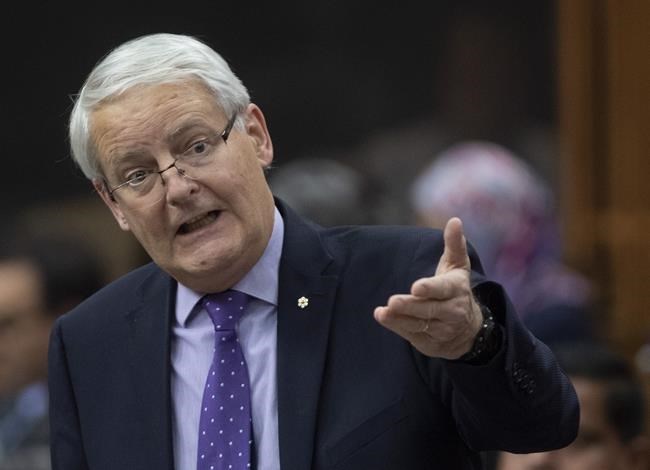OTTAWA — Canada and four other countries are still trying to pressure Iran to release the flight recorders from its Jan. 8 shootdown of a Ukrainian passenger plane, Transport Minister Marc Garneau said Friday.
On March 11, Garneau was at the Montreal meeting of the International Civil Aviation Organization when Iran's representative promised his government would surrender the so-called black boxes to Ukrainian authorities by March 25.
That has not yet happened.
"The boxes are still in Iran and we continue to exert pressure," Garneau said Friday at a government briefing on a video link.
"They said it would be within two weeks. That coincided with the serious onset of COVID-19 in Iran. And they explained that they were not in a position to address that matter at that time."
Iran's ICAO representative, Farhad Parvaresh, was not at the Montreal meeting but he made the promise over the telephone.
The pandemic has ravaged Iran, but the regime must still surrender the flight recorders to honour its obligations under international civil aviation law, Garneau said.
"We continue now to exert pressure on Iran to transfer those boxes in accordance with their obligations," he said.
Ukraine International Airlines Flight 752 was hit by two Iranian missiles shortly after takeoff from the Tehran airport, killing all 176 on board, including 55 Canadian citizens and 30 permanent residents. Dozens more passengers were also bound for Canada, many of them students and academics returning from a winter break.
The Tehran-Kyiv flight was a popular first leg for trips from Iran to Canada.
Britain, Ukraine, Afghanistan and Sweden also lost citizens when the plane was destroyed, and the countries have formed an alliance with Canada to deal with Iran.
They are pressing Iran to co-operate in a transparent investigation so the cause of the missile strike and the crash can be determined and compensation for the victims' families can be paid.
Iran initially covered up the cause of the crash, but was forced to admit that its Revolutionary Guard fired two missiles at the plane.
The incident occurred just after Iran launched missiles into Iraq at two American military bases in retaliation for the U.S. having killed Iran's top general, Qassem Soleimani, days earlier. One of the targeted bases included Canadian troops.
The families of some of the those killed on the Ukrainian airliner have said Ottawa was turning a deaf ear to their concerns because of its renewed focus on the pandemic.
The government has since appointed Ralph Goodale, a former Liberal public safety minister, to be its special adviser on the crash. He has been meeting the families of victims in recent weeks.
Goodale's last cabinet post included overseeing the RCMP and attending international law enforcement meetings.
The envoys from Ukraine and Britain have said that makes Goodale well qualified to push Iran for answers.
Earlier this month, another former Liberal cabinet minister said Canada and its four partner countries would face a tough road in getting answers from the Iranian regime because of who was in charge of the investigation.
Former justice minister Irwin Cotler said Iran had appointed its chief justice, Ebrahim Raisi, to oversee the investigation.
Cotler, a lawyer for Iranian political prisoners and a longtime advocate for human rights, told The Canadian Press that Raisi himself belongs in prison because he was complicit in the mass execution of thousands of Iranian political prisoners in 1988.
This report by The Canadian Press was first published May 29, 2020.
Mike Blanchfield, The Canadian Press

